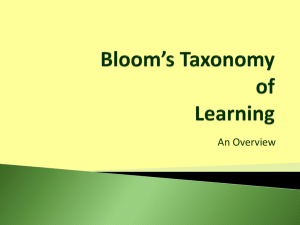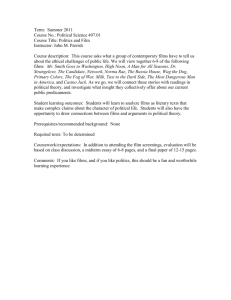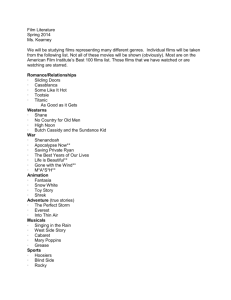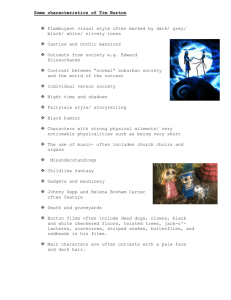Religious Holy Days and Observances
advertisement
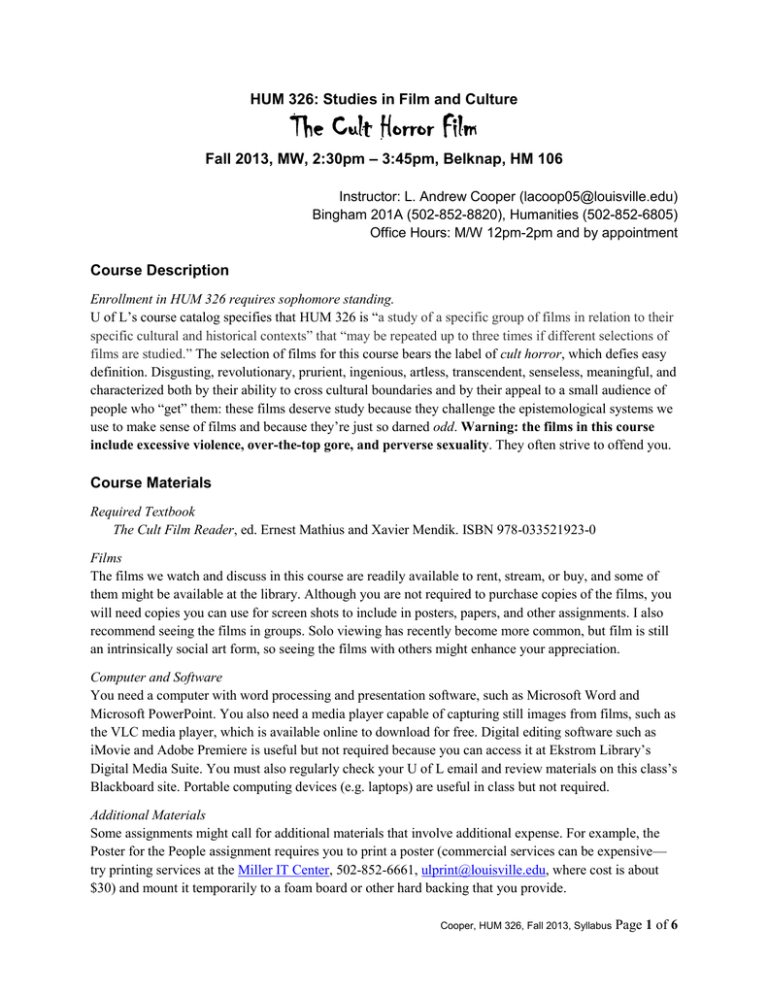
HUM 326: Studies in Film and Culture The Cult Horror Film Fall 2013, MW, 2:30pm – 3:45pm, Belknap, HM 106 Instructor: L. Andrew Cooper (lacoop05@louisville.edu) Bingham 201A (502-852-8820), Humanities (502-852-6805) Office Hours: M/W 12pm-2pm and by appointment Course Description Enrollment in HUM 326 requires sophomore standing. U of L’s course catalog specifies that HUM 326 is “a study of a specific group of films in relation to their specific cultural and historical contexts” that “may be repeated up to three times if different selections of films are studied.” The selection of films for this course bears the label of cult horror, which defies easy definition. Disgusting, revolutionary, prurient, ingenious, artless, transcendent, senseless, meaningful, and characterized both by their ability to cross cultural boundaries and by their appeal to a small audience of people who “get” them: these films deserve study because they challenge the epistemological systems we use to make sense of films and because they’re just so darned odd. Warning: the films in this course include excessive violence, over-the-top gore, and perverse sexuality. They often strive to offend you. Course Materials Required Textbook The Cult Film Reader, ed. Ernest Mathius and Xavier Mendik. ISBN 978-033521923-0 Films The films we watch and discuss in this course are readily available to rent, stream, or buy, and some of them might be available at the library. Although you are not required to purchase copies of the films, you will need copies you can use for screen shots to include in posters, papers, and other assignments. I also recommend seeing the films in groups. Solo viewing has recently become more common, but film is still an intrinsically social art form, so seeing the films with others might enhance your appreciation. Computer and Software You need a computer with word processing and presentation software, such as Microsoft Word and Microsoft PowerPoint. You also need a media player capable of capturing still images from films, such as the VLC media player, which is available online to download for free. Digital editing software such as iMovie and Adobe Premiere is useful but not required because you can access it at Ekstrom Library’s Digital Media Suite. You must also regularly check your U of L email and review materials on this class’s Blackboard site. Portable computing devices (e.g. laptops) are useful in class but not required. Additional Materials Some assignments might call for additional materials that involve additional expense. For example, the Poster for the People assignment requires you to print a poster (commercial services can be expensive— try printing services at the Miller IT Center, 502-852-6661, ulprint@louisville.edu, where cost is about $30) and mount it temporarily to a foam board or other hard backing that you provide. Cooper, HUM 326, Fall 2013, Syllabus Page 1 of 6 Outcomes The table below details the learning outcomes associated with this course. Emphases are not mutually exclusive. For example, virtually all outcomes relate directly or indirectly to critical thinking. Emphasis Rhetoric Filmmakers and film critics use specific vocabulary and techniques to make meaning from sounds and images. Films also function as rhetorical interventions in cultural discourses. Outcomes Demonstrate comprehension and mastery of theoretical articulations of concepts such as “cult” and “horror” as they apply to specific films Critique films’ histories of and capacities for rhetorical intervention, particularly as they either have motivated or could motivate cult spectatorship and paracinematic consumption Evaluate films by defending specific claims about their qualifications as “cult” phenomena Culture, History, and Genre Films reflect the diverse cultures that produce and receive them, and they relate to the history of film as a whole as well as the conventions of specific film genres. Analyze and explain historical relationships between “cult” and “culture,” both as opposing and mutually informing concepts Discuss how personal knowledge of and experience with films relate to the “cult” experience and to understanding of genre affiliations Interpret films’ significance in relation to their historical and cultural contexts Critical Thinking Understanding and interpreting films requires both attention to details (such as frames and shots) and attention to larger structures (such as sequences and diegesis). Analyze films through papers, presentations, and web pages Apply theoretical perspectives on “cult,” “horror,” and other key concepts to cinematic texts Synthesize perspectives and information through unified arguments about the significance of cult horror Enjoy, or at least appreciate, countercultural aesthetics, particularly the aesthetics of the sublime, the ridiculous, and the disgusting Assignments Major Assignments (850 points total) The outcomes in Table 1 refer to the following major assignments, which we will discuss in more detail during class: 1. Poster for the People (individual effort, 200 points). Create a poster (using PowerPoint or other software) that illustrates how specific elements from one of the assigned films has created or could create a cult phenomenon, paying particular attention to the appeals of horror. 2. Cult Culture (individual effort, 2 essays, 150 points each, 300 points total). For each due date, write a short essay (~1,000 words, or 4 pages each) that critiques one of the films assigned during the preceding weeks by analyzing, interpreting, and evaluating elements that you think qualify it for cult status. Consider the film’s relationship with the culture that produced it, its audiences, and its form in addition to aspects of its narrative. Discuss assigned readings in ways that give your arguments theoretically informed perspectives. 3. The Cult Horror Omnibus (group and individual efforts, 250 points total). In a group of five or six classmates, study a number of related films not assigned in class that you believe have or deserve the label “cult horror.” Coordinate your study with other groups in the class so that each group discusses a distinct subcategory of cult horror. Contribute pages to the class wiki to create a class-wide omnibus of intelligence about cult horror phenomena: a. Film Pages (individual, 100 points). Create pages about specific films that belong in your group’s subcategory. Link pages to others on the site to create unity. b. Subcategory Introduction (group, 100 points). Create a page about your group’s subcategory, defining it, historicizing it, and relating it to cult horror in general. Cooper, HUM 326, Fall 2013, Syllabus Page 2 of 6 c. Omnibus Introduction (group, 50 points). Contribute to a page or pages that introduce cult horror and the wiki as a whole. 4. Final Exam (individual effort, 100 points). Demonstrate your knowledge of the films and readings we have studied. Participation (150 points total) Participation in class discussions and activities is mandatory. Demonstrate your knowledge of the readings and films, and share your insights. During class on several unannounced (but usually predictable) occasions, you might complete quizzes that assess your knowledge of assigned readings and films. Maintaining class decorum is part of participation: noisy cell phones, disrespectful behavior, and other intrusions lower productivity and, therefore, your grade. “Disrespectful behavior” includes harassment of any kind, directed either at peers or at the instructor. This course will foster discussions of sensitive issues such as gender, race, and sexuality. All viewpoints are welcome, but as individuals express themselves, they should avoid abusive or insulting language. Course Policies Grading Each assignment has a point value. Assignments add up to a total of 1000 points. The following list shows the letter grades linked to percentages of available points earned, with a description of the work: A (90-100), Exceeds expectations for argument, evidence, organization, and design B (80-89), Meets expectations, with notable merit in some of the categories listed above C (70-79), Meets expectations D (60-69), Meets most expectations, with some problems or omissions F (0-59), Meets few expectations, with significant problems or omissions Failure to complete an assignment results in 0 points. To calculate +/- values, round total points to the 3, 5, or 8 in your percentile range. For example, 895 – 934 points round to 93 (A-), 935 – 974 points round to 95 (A), and 975 – 1000 points round to 98 (A+). Attendance Attendance is required. If you must miss class, email me ahead of time. You have only two “freebie” days, classes you may miss without grade penalties. For other absences, you must have made a prior arrangement with me or have official documentation of an illness, injury, legal obligation, or universitysponsored activity or event that keeps you from class. I will deduct 25 points from your grade for each non-freebie, undocumented absence. Being late to class counts as either a half or a whole absence, depending on how late you are. Missing more than 25% of our class meetings for any reason could result in grade penalties and/or failure. Punctual Work Unless I approve a deadline extension in advance, which is unlikely, I will not accept major assignments after the deadline. You are responsible for all information covered during every class meeting. Academic Conduct Academic dishonesty is prohibited at the University of Louisville. It is a serious offense because it diminishes the quality of scholarship, makes accurate evaluation of student progress impossible, and Cooper, HUM 326, Fall 2013, Syllabus Page 3 of 6 defrauds those in society who must ultimately depend upon the knowledge and integrity of the institution and its students and faculty. For more information, see the Code of Student Rights and Responsibilities (Sections 5 and 6). Using Laptop Computers and Other Digital Devices You may only use your laptop and other digital devices for class activities and note-taking. Using such devices during class for other activities—such as email, web-surfing, social media, or games—is rude and strictly prohibited. Inappropriate laptop use may result in grade penalties and/or expulsion from class. Access The University of Louisville is committed to providing access to programs and services for qualified students with disabilities. If you are a student with a disability and require accommodation to participate and complete requirements for this class, notify me immediately and contact the Disability Resource Center (Stevenson Hall, Room 119, 852-6938) for verification of eligibility and determination of specific accommodations. Religious Holy Days and Observances If your religious observances might require an adjustment in course work, please submit your request(s) to me in writing during the first two weeks of the semester. Sexual Harassment The University of Louisville strives to maintain the campus free of all forms of illegal discrimination as a place of work and study for faculty, staff, and students. Sexual harassment is unacceptable, and unlawful conduct and will not be tolerated in the workplace and the educational environment. Unwelcome sexual advances, requests for sexual favors, and other verbal or physical conduct of a sexual nature constitute sexual harassment, even when carried out through computers or other electronic communications systems. See the Affirmative Action policy, the Student Code of Conduct, and the U of L Computer Account Usage Agreement. Diversity The University of Louisville strives to foster and sustain an environment of inclusiveness that empowers us all to achieve our highest potential without fear of prejudice or bias. We commit ourselves to building an exemplary educational community that offers a nurturing and challenging intellectual climate, a respect for the spectrum of human diversity, and a genuine understanding of the many differences— including race, ethnicity, gender, gender identity/expression, sexual orientation, age, socioeconomic status, disability, religion, national origin or military status—that enrich a vibrant metropolitan research university. We expect every member of our academic family to embrace the underlying values of this vision and to demonstrate a strong commitment to attracting, retaining and supporting students, faculty and staff who reflect the diversity of our larger society. The Fine Print I reserve the right to alter this syllabus when necessary to meet learning objectives, to compensate for missed classes, or for similar reasons. I exercise this right rarely, but I often provide more detailed information during class. This syllabus is your guide. Keep it. Know it. Love it. Cooper, HUM 326, Fall 2013, Syllabus Page 4 of 6 Schedule of Meetings and Assignments NOTE: “CF” followed by numbers and names refers to sections in The Cult Film Reader and their authors. Viewing and reading should be completed prior to the class meeting for which they are indicated. Week Mon., Aug. 26 Wed., Aug. 28 Mon., Sept. 2 Wed., Sept. 4 Mon., Sept. 9 Wed., Sept. 11 Mon., Sept. 16 Wed., Sept. 18 Mon., Sept. 23 Wed., Sept. 25 Mon., Sept. 30 Wed., Oct. 2 Mon., Oct. 7 Wed., Oct. 9 Mon., Oct. 14 Wed., Oct. 16 Mon., Oct. 21 Wed., Oct. 23 Mon., Oct. 28 Wed., Oct. 30 Mon., Nov. 4 Wed., Nov. 6 Mon., Nov. 11 Wed., Nov. 13 Mon., Nov. 18 Wed., Nov. 20 Mon., Nov. 25 Wed., Nov. 27 Mon., Dec. 2 Wed., Dec. 4 Mon., Dec. 9 Wed., DEC. 11 Reading and Viewing Assignments [Introduction] Grindhouse (2007) CF Editorial Intro AND Section 1 Intro LABOR DAY – NO CLASS Grindhouse; CF 1.2 (Benjamin) Troll 2 (1990); CF 1.3 (Sontag) Best Worst Movie (2009); CF 1.10 (Hills) The Masque of the Red Death (1964) CF Foreword (Corman), 2.6 (Everman) Masque; CF 2.12 (O’Toole) Blacula (1972); CF 2.7 (Benshoff) Blacula The Texas Chain Saw Massacre (1974) CF 1.1 (Potamkin), 4.2 (Bourdieu) Texas; CF 2.10 (Staiger) MID-TERM BREAK – NO CLASS The Rocky Horror Picture Show (1975) The Rocky Horror Picture Show CF 4.3 (Austin) Deep Red (1975); CF 3.2 (Needham) Deep Red Videodrome (1983); CF 4.5 (Sanjek) POSTER SESSION Videodrome (1983); CF 1.6 (Grant) The Beyond (1981) The Beyond From Beyond (1986) [with Lovecraft short story] From Beyond [with short films] GUEST ARTIST Dead Alive (1992); CF 3.6 (Wu) Dead Alive (1992) THANKSGIVING HOLIDAY The Blair Witch Project (1999); CF 2.13 (Telotte) Blair Witch / Ginger Snaps Ginger Snaps (2000); CF 4.10 (Baker et al.) EXAM: 2:30pm – 5:00pm Due Dates Cult Culture 1 POSTER DRAFT POSTER DUE Cult Culture 2 Cult Horror Omnibus Cooper, HUM 326, Fall 2013, Syllabus Page 5 of 6 PLEASE READ, SIGN, AND RETURN THESE STATEMENTS TO DR. COOPER. I affirm that I have read the entire syllabus and policy sheet for HUM 326 and understand the information and the responsibilities specified. ____________________________________________ print name ____________________________________________ signature ____________________________________________ date DIRECTIONS: Read carefully and check all that apply. I give my instructor, Dr. L. Andrew Cooper, permission to use copies of the work I do for this course as examples in this and other courses, as examples in presentations, and in print and electronic publications. I understand that permission is optional and will have no influence on my grade. I only give my instructor, Dr. L. Andrew Cooper, permission to use copies of the collaborative work I do in this course, such as documents and videos I create through cooperation with other students. I understand that permission is optional and will have no influence on my grade. I do NOT give my instructor, Dr. L. Andrew Cooper, permission to use copies of the work I do for this course as examples in this and other courses, as examples in presentations, and in print and electronic publications. I understand that permission is optional and will have no influence on my grade. Please indicate whether you want to be acknowledged if your work is used: Please use my name in association with my work. Please use my work, but do NOT acknowledge me. If your instructor decides to use your work, he may wish to contact you. Please provide your contact information below: _________________________________________________________________________ print name _________________________________________________________________________ signature _________________________________________________________________________ email address _________________________________________________________________________ phone number _________________________________________________________________________ print permanent address _________________________________________________________________________ Date Cooper, HUM 326, Fall 2013, Syllabus Page 6 of 6
